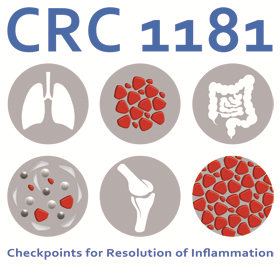Putting a stop to inflammation
Dr. Andreas Ramming, physician at the Department of Internal Medicine 3 – Rheumatology and Immunology (Director: Prof. Dr. med. univ. Georg Schett) and researcher at the Friedrich-Alexander-University Erlangen-Nuremberg (FAU), was successful in the toughest selection procedure for European funding: Over the next five years, the European Research Council (ERC) will support his research project on the investigation of autoimmune diseases with one of the ERC Starting Grants endowed with 1.5 million euros. In the strict selection of project proposals, the ERC decides on the basis of a comprehensive review process involving a large number of leading international scientists in the respective research fields. Less than ten percent of the research projects submitted pass the hurdle. The ERC awards these grants annually to the most promising young scientists, who are thus given the opportunity to expand their own research groups and advance research projects with high innovation potential.
Between 10 and 15 million people in Germany suffer from an autoimmune disease – and the number is rising. The immune system can no longer distinguish between the patient’s own tissue and a threat from outside and triggers an inflammation in the body as a defensive reaction, usually in an organ such as the intestine or the skin. In many patients, the autoimmune disease is a kind of systemic disease: Over time, the inflammation spreads from the originally affected organ to other areas of the body – the disease becomes more serious and the patient’s suffering increases.
Dr. Andreas Ramming from the Department of Internal Medicine 3 – Rheumatology and Immunology of the University Hospital Erlangen wants to find new approaches for the treatment of these diseases: Together with his research group, he is investigating molecular mechanisms that trigger the spread of the autoimmune reaction to other regions of the body. In recent years, Andreas Ramming and his team have collected data and discovered the first molecular signatures that seem to favour this disastrous development. Now the physicians want to get to the bottom of the processes behind it and understand which cells are involved. It is already clear that the innate lymphoid cells discovered a few years ago play a more important role than previously assumed.
With research funds from the ERC-Starting Grant amounting to almost 1.5 million euros, Ramming and his team hope to continue the experimental approaches they have developed in recent years and, if possible, develop a completely new therapeutic approach for autoimmune diseases that will help prevent the spread of inflammation right from the start instead of treating it symptomatically afterwards. The urge to spread can be observed in almost all of these diseases: from multiple sclerosis to Crohn’s disease and rheumatoid arthritis. Ramming has chosen psoriasis arthritis – better known as psoriasis – as a model disease for his research because inflammations that initially start on the skin often spread to joints and tendons over the years.
“There are currently no therapies available to prevent the spread of the disease right from the start,” explains the scientist. “It will certainly be some time before we develop a treatment method, but we hope to take a significant step forward in the coming years and soon be able to provide relief to patients with these diseases as well.
Further Information:
Dr. Andreas Ramming
Telefon: +49 9131 85- 34742
E-Mail: andreas.ramminguk-erlangen.de
Quelle: uni | mediendienst | forschung Nr. 58/2019 vom 4. September 2019

